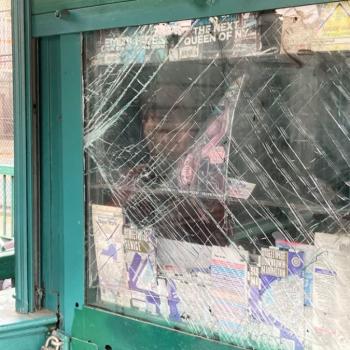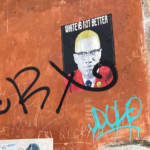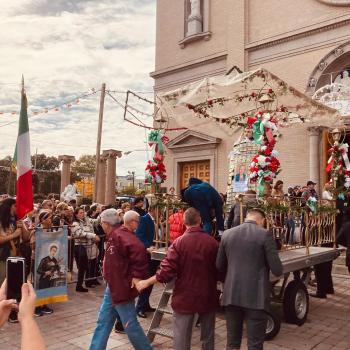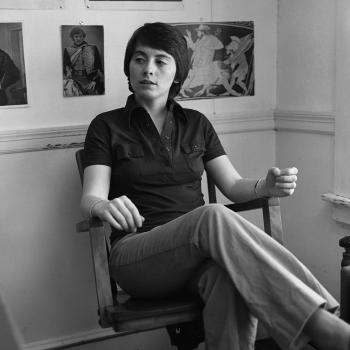I met Danielle (DL) Mayfield last year when she spoke on a panel about serving others without taking on a “savior complex.” She shared her experience of aspiring to become an evangelical missionary as a teen, and how her encounters with her immigrant neighbors challenged her understanding of what it means to share the Gospel with others. I was particularly moved by how she spoke about the need for neighborliness in an increasingly individualistic culture. I asked Danielle to answer a few questions about immigration, consumerism, and finding hope in postmodern culture.
SA: In your writings, you describe your experience of getting to know your neighbors, mostly refugees from Somalia, and fostering a sense of community with them. Many people today stop and put up a wall (whether figurative or literal) as soon as they detect that their neighbor is different from themselves. People are easily intimidated by differences in race, religion, and ethnicity, or even smaller scale things like personality type or political persuasion. In my own experience, I often avoid making eye contact with my own neighbors because I don’t really know them and it makes me feel awkward. I feel much more comfortable talking to people I already know. Why do you think people are tending more toward isolationism? Where do you think this fear of the “other” comes from?
DLM: This is a really big question! I do think it stems from a place of fear, and from ingrained cultural messages about the proper response to power. For me, coming from a white evangelical background, I went into missions work with a mixture of motives–I both was interested in other cultures and curious about them, while at the same time learning how to convert them exactly to my way of thinking/seeing the world. I needed to step back and assess what I believed about shalom and God’s dream for the world in a pluralistic society: did I believe God wanted me and my people to be in charge? Or that we were supposed to be the servants of those whom the world has abused? I slowly came around to the latter mindset. And I realized that engaging with people who are different from us–especially people for whom the world has been unkind–makes us assess ourselves, our privilege, and our positions in the world. Do we want to keep out the people that make us think twice about our carefully curated beliefs about our country or our religion? Or can we be curious and welcome them in (and the tension they will no doubt bring with them)?
My parents tell me about the days when everyone in the neighborhood knew each other and were involved in local affairs and organizations. I know that when I was in high school, I thought going to the block party or events hosted at the public library was “lame” and boring. I instead preferred to read about celebrity gossip or national politics on my phone. Why do you think so many of us are reluctant to get involved in local initiatives and instead focus on macro-level affairs?
I don’t actually know because I am pretty obsessed with local politics and neighborhood events! Just the other day my daughter (who struggles with anxiety) asked me why I wasn’t afraid of someone breaking into our house. I told her that I knew all of our neighbors and they knew me, and we watched out for each other. I am like an old eagle-eyed grandma roaming the streets. I know all the kids and all the regulars in our neighborhood that is considered “unsafe” or “under-resourced” because it has a high concentration of people experiencing poverty. But I love it and instead when I drive around suburban neighborhoods I get a sense of isolation that leads to real vulnerability. From my viewpoint many people of privilege just get on the escalator of the American dream without interrogating it: buying the biggest house possible, moving to a neighborhood with the “good” school for your kids, and eventually they realize they have not thought about community/neighbor engagement in any meaningful way. But middle class suburban individualism is incredibly strong and very hard to break through once you are in it, and leads to segregated lives and ultimately a sense of futility when it comes to invoking systemic change.
Locally owned businesses can play a significant role in fostering a sense of community. Unfortunately, as large corporations make accessing products and services more efficient and inexpensive, local businesses are being forced to close down. I’m conflicted when I order a book from Amazon Prime that I’m purchasing at a discounted cost and that I know will arrive in front of my door in about two days, as opposed to taking a ride to the locally owned bookshop and paying full price for a book that they may not have in stock. How can those of us who have to be prudent with time and money still find ways to support local businesses?
It’s great to start asking this question! I try and limit relying on big corporations but I no longer have hard and fast rules. But supporting businesses that actually help support the local community is absolutely a way to do local justice and to make sure you aren’t contributing to larger issues like gentrification (which is really just people of privilege capitalizing on the disinvestment of others).
You encourage your readers to focus on growing in “neighborliness.” As mentioned earlier, many of your neighbors are people of color. What’s the difference between being a neighbor and being a white savior?
Ah, the question that haunts my dreams. Seriously! I have been thinking a lot about how true works of mercy always upend the status quo if they are rooted in a pursuit of neighborliness/justice, while charity never does. So I assess my life and see if it is more uncomfortable now or if I am benefiting from systems that uphold hierarchy and white supremacy. That is a pretty good litmus test! But in general, being aware of privilege and power, committing to listening more than “helping”, sticking around for the long term, and commitment to pursuing mutuality in relationships have all been very helpful as I work towards being a good neighbor (and receiving the blessings from my neighbors).
You explain in your book that as a Christian, you felt compelled to send your kids to public school and to try to build up a sense of community there. I have religious friends who have pulled their kids out of public schools because they felt the environment to be overly focused on data and numbers, as opposed to the actual needs of their students as human beings, in addition to being hostile to their religious beliefs. Administrators and teachers, according to them, tend to be uninterested in developing the type of community that you write about. What would you say to religious parents who are concerned about the dehumanized mentality present in many public schools?
I would say those parents are participating in a long line of privileged people who can afford to focus on the needs of their individual child without looking at the needs of the common good. All of us who are parents or caregivers are educating our children all the time: you are free to teach your children about whatever you want outside of the classroom. When it comes to schools, people in the end really seem to care about academic success and hoarding resources and segregating themselves away from those that are deemed undesirable–in the US it is kids who are poor, and come from communities of color. I’m involved in our school and involved in the education of my children outside of it. And I can say without a doubt my kids are learning how to be in community with complex people who are very different from them, and how to work towards a place where they can all flourish.
Often people who are most xenophobic are part of what author Chris Arnade calls “the back row.” They usually live in “forgotten” parts of the country where there is little work and rampant drug use. Many of these people, especially those who are white, feel that the current discourse offered by identity politics affords them little to no agency or representation. Arnade cites examples of white working-class Trump supporters in the Midwest feeling threatened by new waves of immigrants from Central America and Sub-Saharan Africa. What kinds of initiatives can help people from different backgrounds to foster a sense of collaboration, dialogue, and unity?
Hmmmmm I would disagree with that premise. I think many people (including “front row” people) learn to couch their xenophobia in more culturally accepted ways and turn it into policy. The midwest is a fascinating space because there is more real diversity there than say, liberal places like Portland. And it shows that living side by side with people isn’t enough: if the same power dynamics are at play, then hostility can grow. Proximity doesn’t change anything. But entering into the suffering of another person can change us. This is what happened to me, it has happened to members of my family. But it is slow going. There is no quick fix for white supremacy and idolatrous nationalism. I engage in a mixture of Christian disciplines like repentance and lament, works of mercy, and trying to live into what Dorothy Day calls “the duty of delight.” My immigrant and refugee neighbors are a light to me and my family, daily, and I try and celebrate that.
You often cite the works of spiritual writers and mystics. How has your interest in the contemplative life complemented your work in social justice?
I don’t think I could survive on the diet of bad news we receive on the daily if I didn’t start to veer towards the mystics and contemplatives! They are obsessed with noticing and paying attention to where God is at work in the world, without necessarily trying to gain cultural or political power. They are so weird and so great and they really believe God is at work and that God is paying attention to the world and our lives. And that God loves us! This is so important for me to connect with, so I try and do prayer walks, make special desserts, and pay attention to both the inequality and the beauty of the world around me as much as possible.
D. L. Mayfield lives and writes on the outskirts of Portland, OR with her husband and two small children. Mayfield likes to write about refugees, theology, and downward mobility, among other topics. Her book of essays, Assimilate or Go Home: Notes from a Failed Missionary on Rediscovering Faith was released by HarperOne in 2016. Her writing has appeared in a variety of places, including McSweeneys, Christianity Today, Sojourners, The Washington Post, Image Journal, Vox, and The Rumpus, among others. Her second book will be released in early 2020. She is trying very hard to be a good neighbor.
All photos are from http://www.dlmayfield.com/












